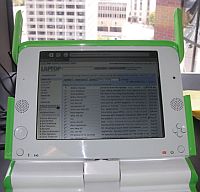No matter the XO laptop price increase, One Laptop Per Child technology is still clock-stopping hot. But don't rely just on my tech-lust to be amazed by the computing revolution spanned from the OLPC developers skills, read what other, respected journalist have to say.
First we have a Laptop Magazine review of the XO laptop, which Joanna Stern perfectly titled as "Why Do The Kids Get to Have All the Fun?". As expanded on in the article:
After spending a day with the XO machine, one question remains: Why aren't our laptops back in the office half as cool? The decidedly Fisher Price look aside, mainstream laptop users should get to share in some of the innovative technology and fun.And that we should, hopefully with American OLPC laptop sales. I'm confident Children's Machines would be this Christmas' must-have if only to measure battery life in days not hours, since I'm currently staring at a quickly depleting laptop battery, capable of 4 hours max of usage. So I echo Joanna Stern's conclusion:
When we finally handed the XO laptop back, we were surprised at how fast the four hours had passed. The XO laptop left us wanting not only more hands-on time but a machine of our own.Americans aren't the only XO laptop reviewers giving OLPC serious respect for their design - the Danes can't get enough of the now $188 laptop either. Nicolai Devantier of Computerworld Danmark took an XO to a school in Roskilde, Denmark for a children's review of the OLPC technology. And what might two young Danes say about their newest little green friend?Its altruistic purpose, along with its blend of convenient collaboration tools, clever hardware, and innovative operating system makes this machine worthy of the global recognition it's receiving.
In its own way, the XO is more of a catalyst for technological change than Apple's iPhone.
The XO-computer's design was a hit among the two pupils. The green and white plastic, the handle, the rabbit-ear-antennas and the keyboard caused excitement. On the surface it seemed like the design team from One Laptop per Child (OLPC) have hit a bulls eye.Before you think Denmark is all OLPC fanboy, or you confuse laptops with education reform, do note the cautionary tone of Jan Soelberg, an educational expert from Denmark's University of Aarhus in a CIO interview about classroom usage of computers to increase education:"It's cool," they both said when the XO-computer was placed in front of them. "It looks like an ogre where the antennas are its ears."
"The training of the teachers is crucial. The PC is only a tool and when used in the learning process the teacher becomes a key person. At first the children would have to have someone to turn to if the computer doesn't work.Or in other words, OLPC implementation should include policy recommendations to change educator's underlying teaching methods to fully utilize XO's in the classroom, no matter how clock-stopping hot the technology or noble the One Laptop Per Child mission.When the initial learning has been provided the learning has to be engineered to fit this new tool. It will be extremely important what use you will make of this", Soelberg said.




pls pls pls pls pls pls pls pls pls pls i need a laptop for fre bcs my poor mum cant afford
I am getting sick of comments that say developing countries can only have the XO if they carry out "education reform" first.
Please name any developed country that introduced PCs that way
I have two comments.
Firstly, it is unreasonable to ask developing countries, that are struggling just to get school rooms and enough teachers to make a major reform of curriculum and teacher capacity development.
Lets just start the process with introducing XOs, like most othter countries did with traditional PCs.
Secondly, nobody has mentioned the 50% of children (in least developed countries) that cant even go to school. By stopping or slowing deployment of OLPCs because of education reform issues deprives these children an opportunity to at least get some form of learning.
I am not an educationalists, but surely common sense must say it is better to start something than to wait for the perfect solution.
Ian
I agree with ian Thomson. Let's get those out in developped countries like iPods and developping countries like mobile phones. And let the school systems adapt to it gradually.
I believe it is important for developped countries to adopt the OLPC in school-wide experiments cause that will involve the developped countries software and learning industries and thus it will help OLPC worldwide perfection good learning techniques and it will bring better educational software globally.